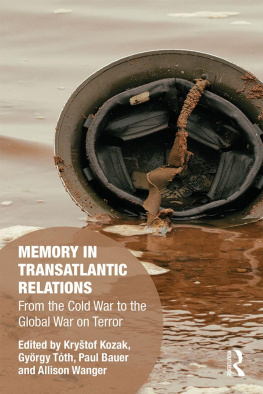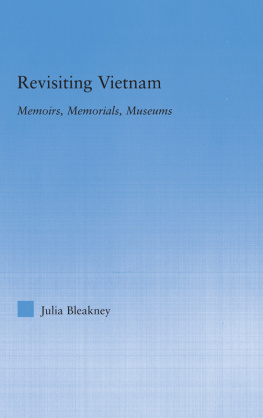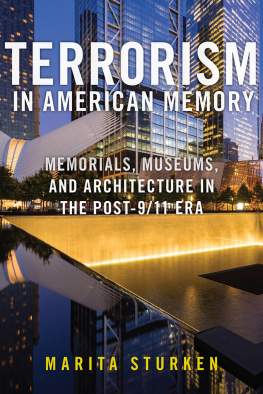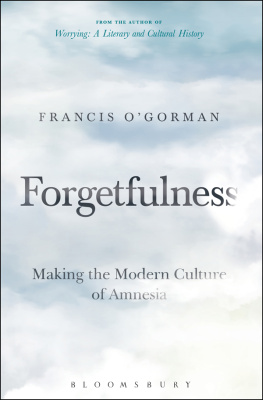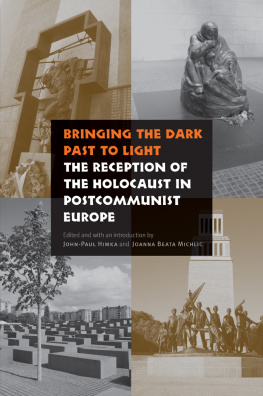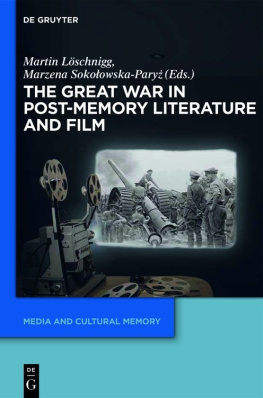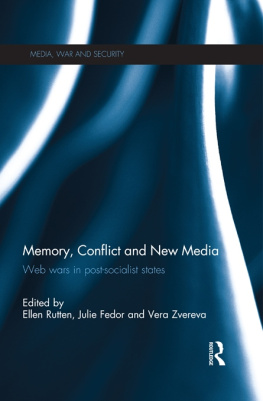
Memory, the City and the Legacy of World War II in East Central Europe
After the Second World War, millions of people across Eastern Europe, displaced as a result of wartime destruction, deportations and redrawing of state boundaries, found themselves living in cities that were filled with the traces of the foreign cultures of the former inhabitants. In the immediate post-war period these traces were not acknowledged, the new inhabitants going along with official policies of oblivion, the national narratives of new post-war regimes, and the memorializing of the victors. In time, however, and increasingly over recent decades, the former other pasts have been embraced and taken on board as part of local cultural memory. This book explores this interesting and increasingly important phenomenon. It examines official ideologies, popular memory, literature, film, memorialization and tourism to show how other pasts are being incorporated into local cultural memory. It relates these developments to cultural theory and argues that the relationship between urban space, cultural memory and identity in Eastern Europe is increasingly becoming a question not only of cultural politics, but also of consumption and choice, alongside a tendency towards the cosmopolitanization of memory.
Uilleam Blacker is a lecturer in comparative Russian and East European culture at the School of Slavonic and East European Studies, University College London.
BASEES/Routledge Series on Russian and East European Studies
Series editors:
sociology and anthropology: Judith Pallot (President of BASEES and Chair), University of Oxford
economics and business: Richard Connolly, University of Birmingham
media and cultural studies: Birgit Beumers, University of Aberystwyth
politics and international relations: Andrew Wilson, School of Slavonic and East European Studies, University College London
history: Matt Rendle, University of Exeter
This series is published on behalf of BASEES (the British Association for Slavonic and East European Studies). The series comprises original, high-quality, research-level work by both new and established scholars on all aspects of Russian, Soviet, post-Soviet and East European Studies in humanities and social science subjects.
Ideology and Social Protests in Eastern Europe
Beyond the Transitions Liberal Consensus
Veronkia Stoyanova
Belarus under Lukashenka
Adaptive Authoritarianism
Matthew Frear
Class Cultures in Post-Socialist Eastern Europe
Draen Cepi
Belarus Alternative Visions
Nation, Memory and Cosmopolitanism
Simon Lewis
Russian Culture in the Age of Globalization
Edited by Vlad Strukov and Sarah Hudspith
Security, Society and the State in the Caucasus
Edited by Kevork Oskanian and Derek Averre
Memory, the City and the Legacy of World War II in East Central Europe
The Ghosts of Others
Uilleam Blacker
For a full list of available titles please visit: www.routledge.com/BASEES-Routledge-Series-on-Russian-and-East-European-Studies/book-series/BASEES
Memory, the City and the Legacy of World War II in East Central Europe
The Ghosts of Others
Uilleam Blacker
First published 2019
by Routledge
2 Park Square, Milton Park, Abingdon, Oxon OX14 4RN
and by Routledge
52 Vanderbilt Avenue, New York, NY 10017
Routledge is an imprint of the Taylor & Francis Group, an informa business
2019 Uilleam Blacker
The right of Uilleam Blacker to be identified as author of this work has been asserted by him in accordance with sections 77 and 78 of the Copyright, Designs and Patents Act 1988.
All rights reserved. No part of this book may be reprinted or reproduced or utilised in any form or by any electronic, mechanical, or other means, now known or hereafter invented, including photocopying and recording, or in any information storage or retrieval system, without permission in writing from the publishers.
Trademark notice: Product or corporate names may be trademarks or registered trademarks, and are used only for identification and explanation without intent to infringe.
British Library Cataloguing-in-Publication Data
A catalogue record for this book is available from the British Library
Library of Congress Cataloging-in-Publication Data
A catalog record for this book has been requested
ISBN: 978-1-138-91436-0 (hbk)
ISBN: 978-1-315-69086-5 (ebk)
Typeset in Times New Roman
by Apex CoVantage, LLC
Contents
The research that led to this book began during my time as a postdoctoral research associate on the Memory at War project at the Department of Slavonic and East European Studies, University of Cambridge. The project was funded by Humanities in the European Research Area, and my position was partly funded by the Newton Trust. I am grateful to Alexander Etkind, Rory Finnin, Emma Widdis and all my former colleagues on Memory at War and to everyone else at the Slavonic department in Cambridge for providing such a stimulating environment in which to begin this research. I am particularly indebted to Ed Saunders for advice on Kaliningrad, and to Julie Fedor for reading drafts of this book. I am also grateful to Oliver Ready and all at St Antonys College, Oxford, where I was able to continue the project for a year undistracted. The project was completed at UCL SSEES, and in many ways its roots lie there also, as many of the ideas in the book can be traced back to my time as a PhD student and the study of Ukrainian literature that I embarked upon there. I am thus very grateful to all my colleagues, present and past, at SSEES, but particularly to my former PhD supervisor, Tim Beasley-Murray, and also to Professor Arnold McMillin, for years of wisdom and friendship. While the research project may have started some years after I left the University of Glasgow, I would never have developed my interest in east-central Europe without the enthusiasm and dedication of my teachers there. I would thus also like to express my gratitude to all my former teachers at Glasgow, and in particular to Professor Andrei Rogatchevski. I would also like to thank the editors at Routledge for their understanding and professionalism in producing the book.
Finally, I would like to thank my family, Patricia, Bill and Eilidh, and, most of all, I would like to thank my wife, Olesya Khromeychuk, whose amazing combination of intellectual and emotional support was invaluable in the writing of this book.
I am where I am
The distinguished Polish poet Adam Zagajewski was born on 21 June 1945 in the eastern Polish city of Lww. The city was coming to the end of its sixth year of war. It had witnessed three occupations (Soviet, then Nazi, then Soviet again), during which it had experienced repression, terror, deportations, pogroms, the creation of a ghetto and a concentration camp in which the citys Jews were murdered, and multilateral conflict among the occupying powers, Polish and Ukrainian forces. Before Zagajewski was two months old, an agreement had been signed between the Soviet Union and the puppet Provisional Government of National Unity in Warsaw that ceded Lww to the Ukrainian Soviet Socialist Republic.1 In many ways, the multi-ethnic pre-war city about half-Polish with large Jewish and Ukrainian minorities had already been destroyed, but this agreement sealed its demise. The Poles who remained in the city were deported to the new, post-war Poland, which had been dramatically reduced in size and shifted westwards, its eastern territories lost to the Soviet Union and new, former German lands added in the west. Zagajewskis family was settled in the Silesian city of Gliwice, formerly German Gleiwitz, from which the German population was expelled after 1945. Zagajewski was only four months old when he left Lww and grew up with no direct knowledge of the city of his birth, yet he shared an overwhelming, second-hand, family memory of it. There was always too much of Lww, he wrote in a famous poem about nostalgia for the lost city among those who were forced to leave it, and for whom Lww is everywhere.2 In an essay published in 1991, the poet describes experiencing a strange sense of doubleness of both space and memory as he walks through Gliwice with his grandfather:


